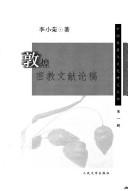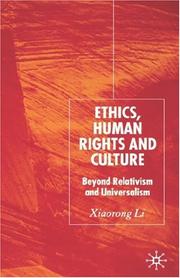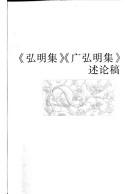| Listing 1 - 9 of 9 |
Sort by
|
Book
ISBN: 0295804432 9780295804439 9780295992051 0295992050 9780295992297 0295992298 Year: 2012 Publisher: Seattle : University of Washington Press,
Abstract | Keywords | Export | Availability | Bookmark
 Loading...
Loading...Choose an application
- Reference Manager
- EndNote
- RefWorks (Direct export to RefWorks)
This study of poetry by women in late imperial China examines the metamorphosis of the trope of the "inner chambers" (gui), to which women were confined in traditional Chinese households, and which in literature were both a real and an imaginary place. Originally popularized in sixth-century "palace style" poetry, the inner chambers were used by male writers as a setting in which to celebrate female beauty, to lament the loneliness of abandoned women, and by extension, to serve as a political allegory for the exile of loyal and upright male ministers spurned by the imperial court. Female writers of lyric poetry (ci) soon adopted the theme, beginning its transition from male fantasy to multidimensional representation of women and their place in society, and eventually its manifestation in other poetic genres as well.Emerging from the role of sexual objects within poetry, late imperial women were agents of literary change in their expansion and complication of the boudoir theme. While some take ownership and de-eroticizing its imagery for their own purposes, adding voices of children and older women, and filling the inner chambers with purposeful activity such as conversation, teaching, religious ritual, music, sewing, childcare, and chess-playing, some simply want to escape from their confinement and protest gender restrictions imposed on women. Women's Poetry of Late Imperial China traces this evolution across centuries, providing and analyzing examples of poetic themes, motifs, and imagery associated with the inner chambers, and demonstrating the complication and nuancing of the gui theme by increasingly aware and sophisticated women writers.
Chinese literature --- History and criticism. --- Women authors

ISBN: 7020040764 Year: 2003 Publisher: Beijing : Renmin Wenxue Chubanshe,
Abstract | Keywords | Export | Availability | Bookmark
 Loading...
Loading...Choose an application
- Reference Manager
- EndNote
- RefWorks (Direct export to RefWorks)

ISBN: 1403985480 Year: 2006 Publisher: New York (N.Y.) : Palgrave Macmillan,
Abstract | Keywords | Export | Availability | Bookmark
 Loading...
Loading...Choose an application
- Reference Manager
- EndNote
- RefWorks (Direct export to RefWorks)
Is it possible, given culturally incongruent perspectives, to validate any common standards of behavior? Is it possible to implement human rights in societies without incorporating the idea into their fabric of culture? Is it possible for cultural communities to survive in the contemporary world without rights protection? This book addresses questions like these in the light of an inventive and original understanding of culture.
Cultural pluralism. --- Human rights. --- Pluralism (Social sciences). --- Social ethics.

ISBN: 7806597638 9787806597637 Year: 2005 Publisher: Chengdu Shi : Ba Shu shu she,
Abstract | Keywords | Export | Availability | Bookmark
Book
ISBN: 9781604979527 Year: 2018 Publisher: Amherst Cambria Press
Abstract | Keywords | Export | Availability | Bookmark
 Loading...
Loading...Choose an application
- Reference Manager
- EndNote
- RefWorks (Direct export to RefWorks)
""Fragrant and bedazzling" (xiangyan) is a Chinese phrase synonymous with sensual and bewitching feminine beauty and, in literature, eroticism. Sensual literature, even to many scholars today, is morally suspect. Situated in China's recent past from the late sixteenth to the early twentieth century, this study has brought to light a literary tradition and underscored intellectual trends that have been neglected, marginalized, misunderstood, and even condemned. This book will be of value to scholars of literary and intellectual movements in late imperial and modern China, sexuality, gender, literary decadence, modernism, countercultures, and erotic literature"--
Erotic literature, Chinese --- Sensuality in literature --- History and criticism
Book
ISBN: 9780295992297 9780295992051 Year: 2012 Volume: *1 Publisher: Seattle ; London University of Washington Press
Abstract | Keywords | Export | Availability | Bookmark
 Loading...
Loading...Choose an application
- Reference Manager
- EndNote
- RefWorks (Direct export to RefWorks)
Book
Year: 1997 Publisher: Antwerp University of Antwerp
Abstract | Keywords | Export | Availability | Bookmark
 Loading...
Loading...Choose an application
- Reference Manager
- EndNote
- RefWorks (Direct export to RefWorks)
Industrial economics --- International economic relations --- China
Book
Year: 1997 Publisher: Antwerp UIA. Centre for international management and development
Abstract | Keywords | Export | Availability | Bookmark
 Loading...
Loading...Choose an application
- Reference Manager
- EndNote
- RefWorks (Direct export to RefWorks)
Book
Year: 1997 Publisher: Antwerp UIA. Centre for international management and development
Abstract | Keywords | Export | Availability | Bookmark
 Loading...
Loading...Choose an application
- Reference Manager
- EndNote
- RefWorks (Direct export to RefWorks)
| Listing 1 - 9 of 9 |
Sort by
|

 Search
Search Feedback
Feedback About UniCat
About UniCat  Help
Help News
News